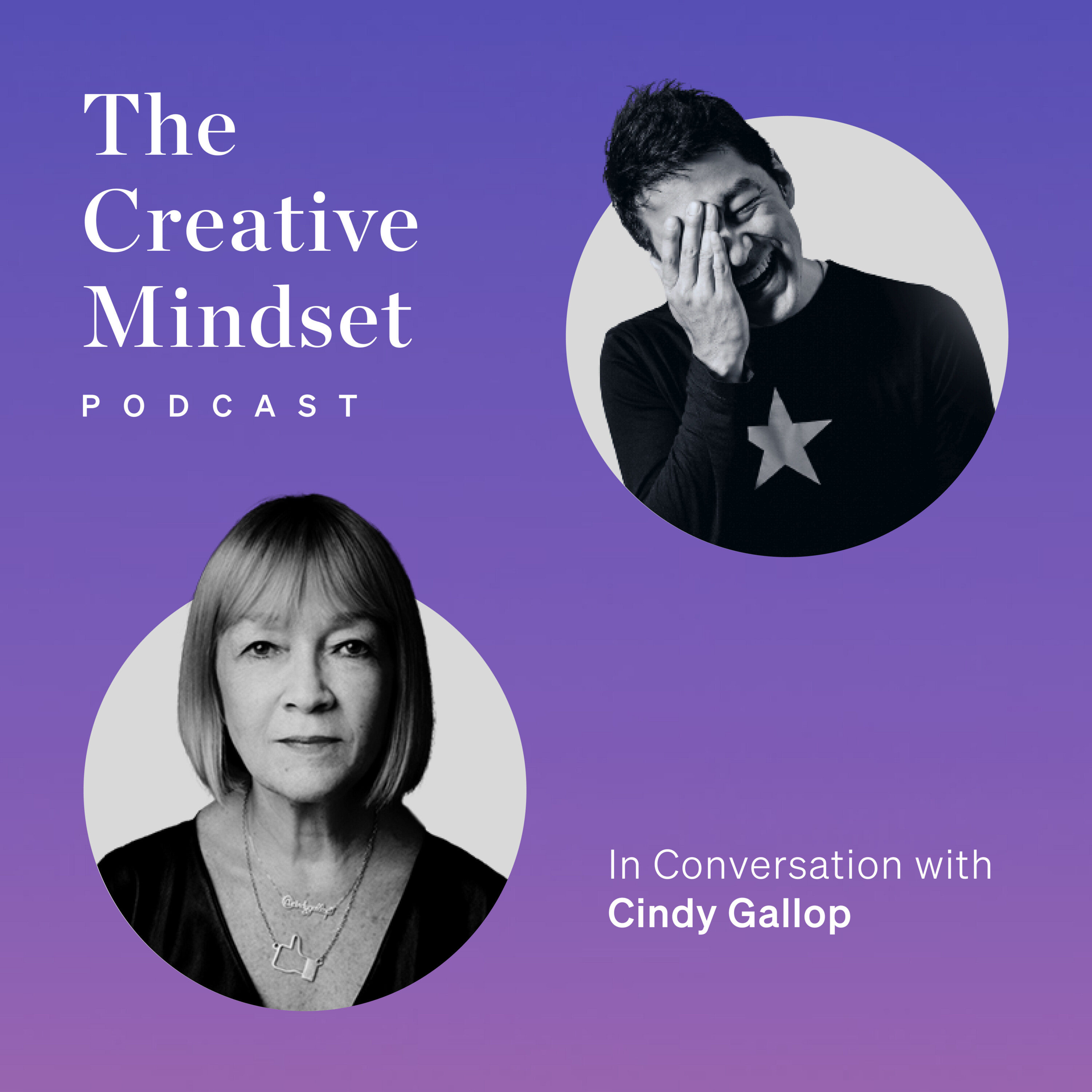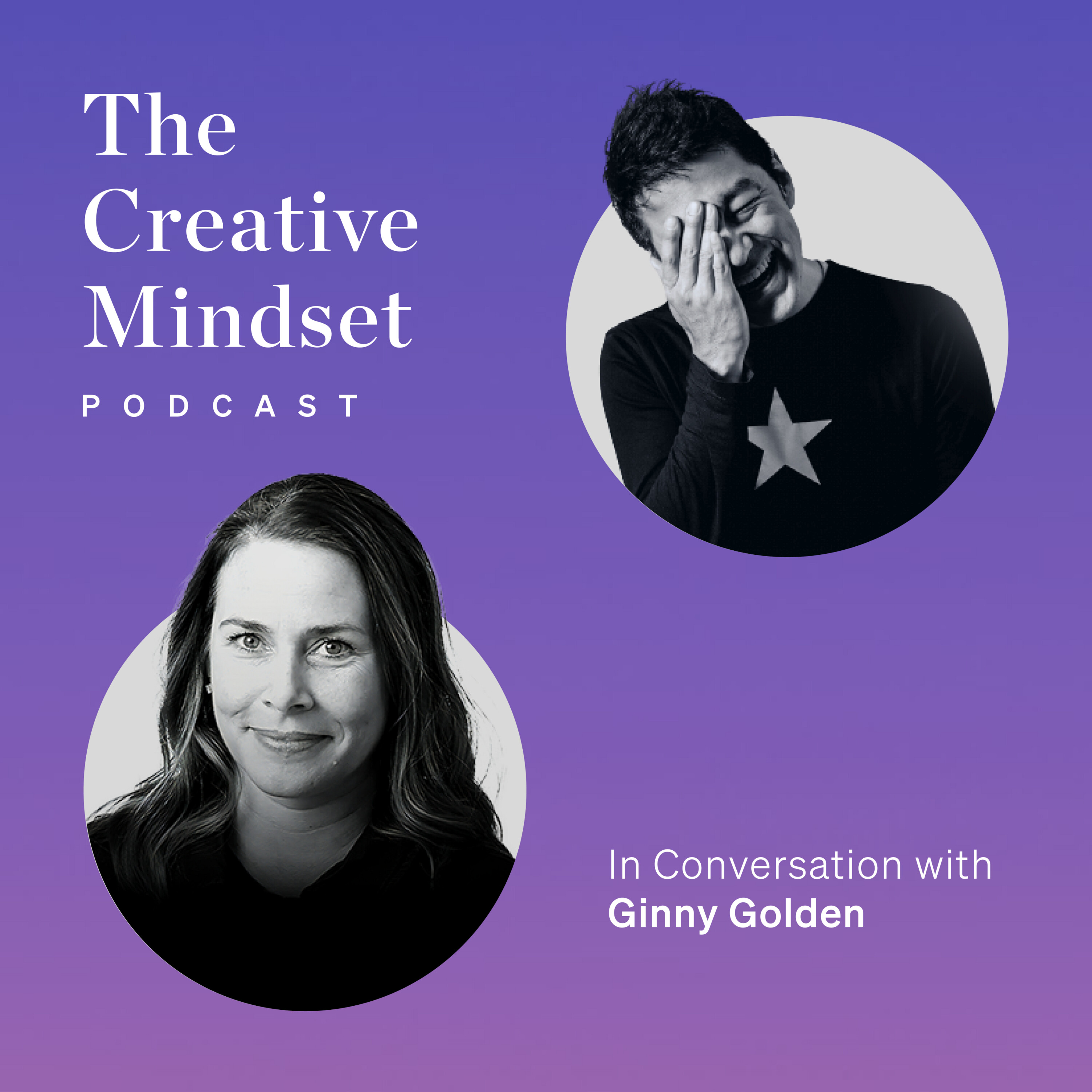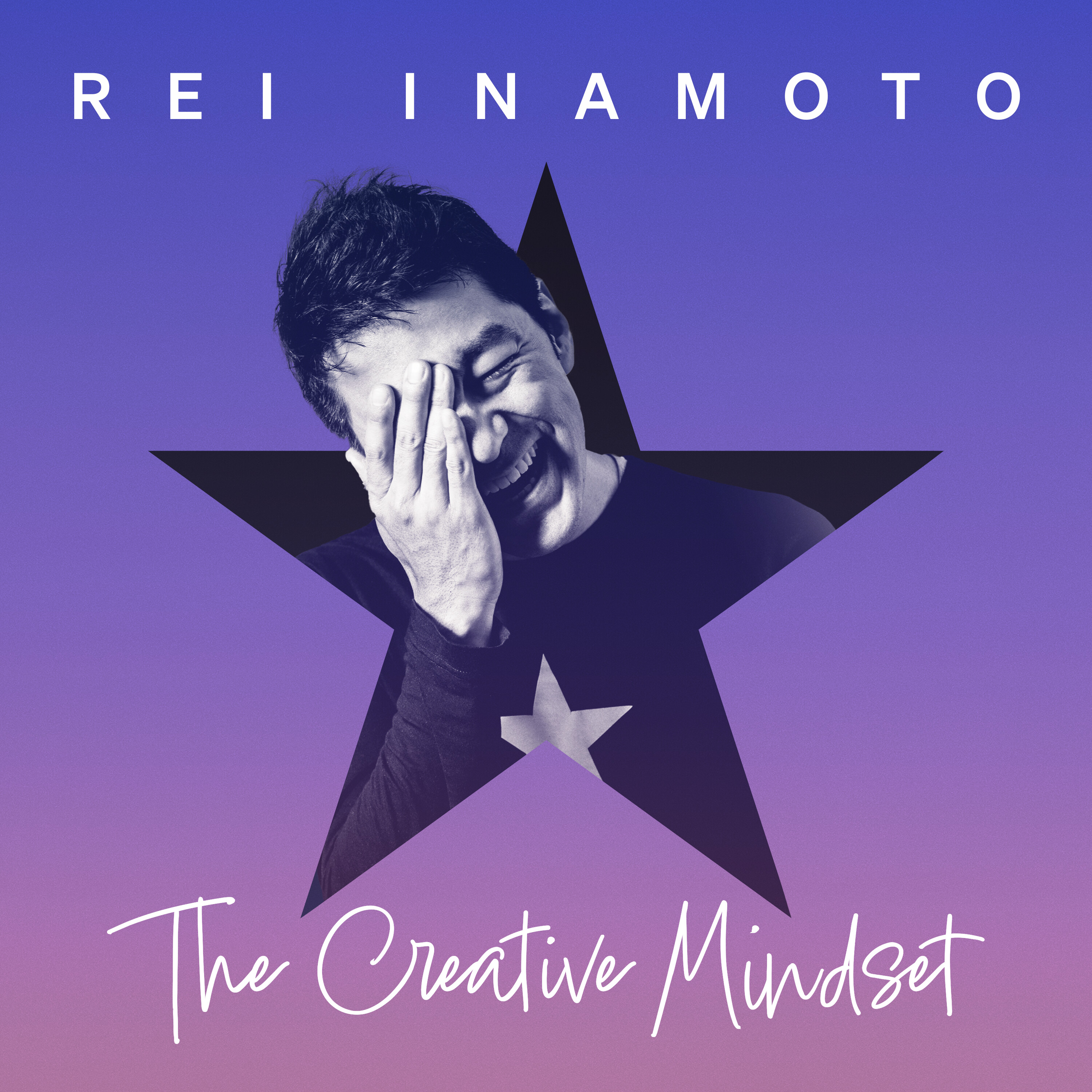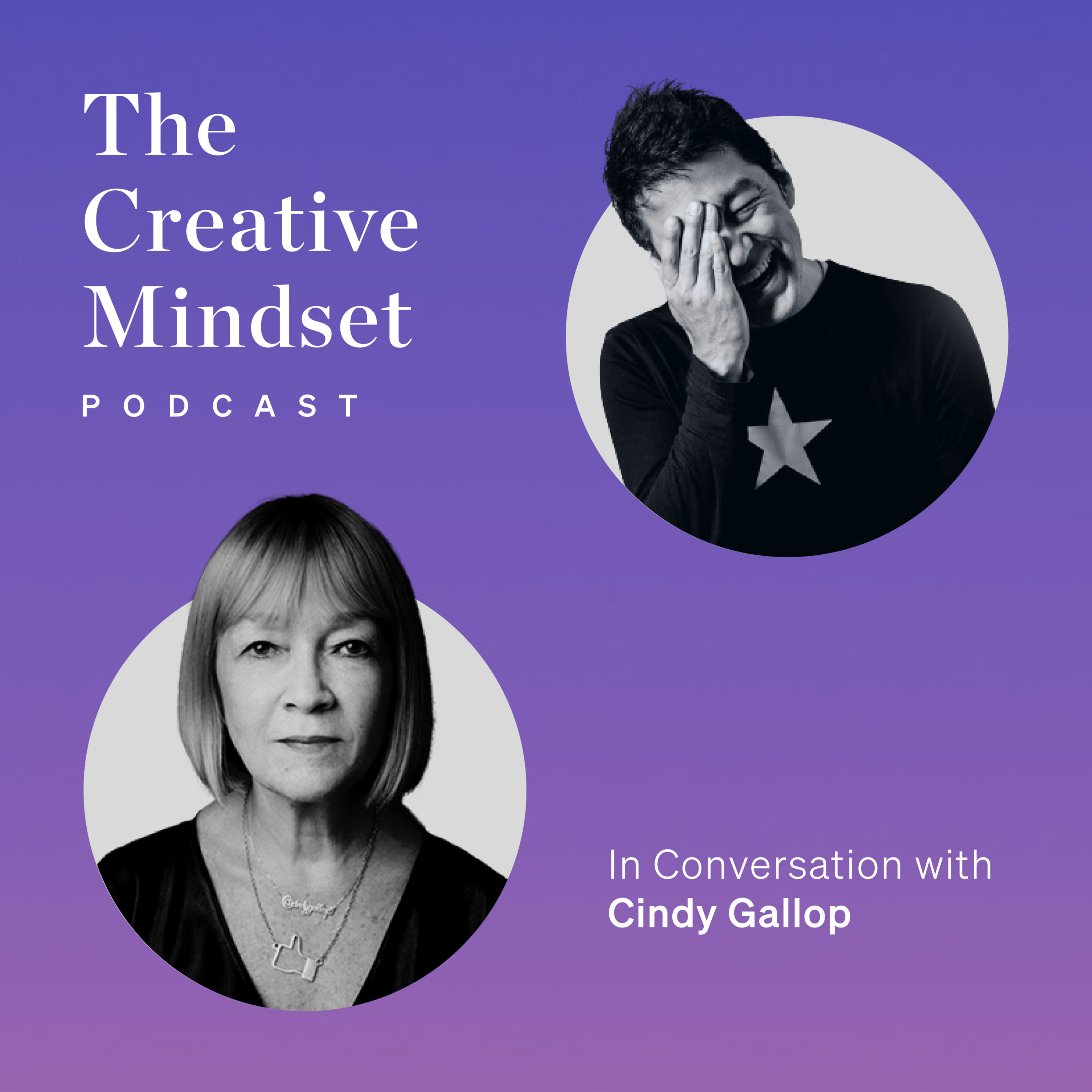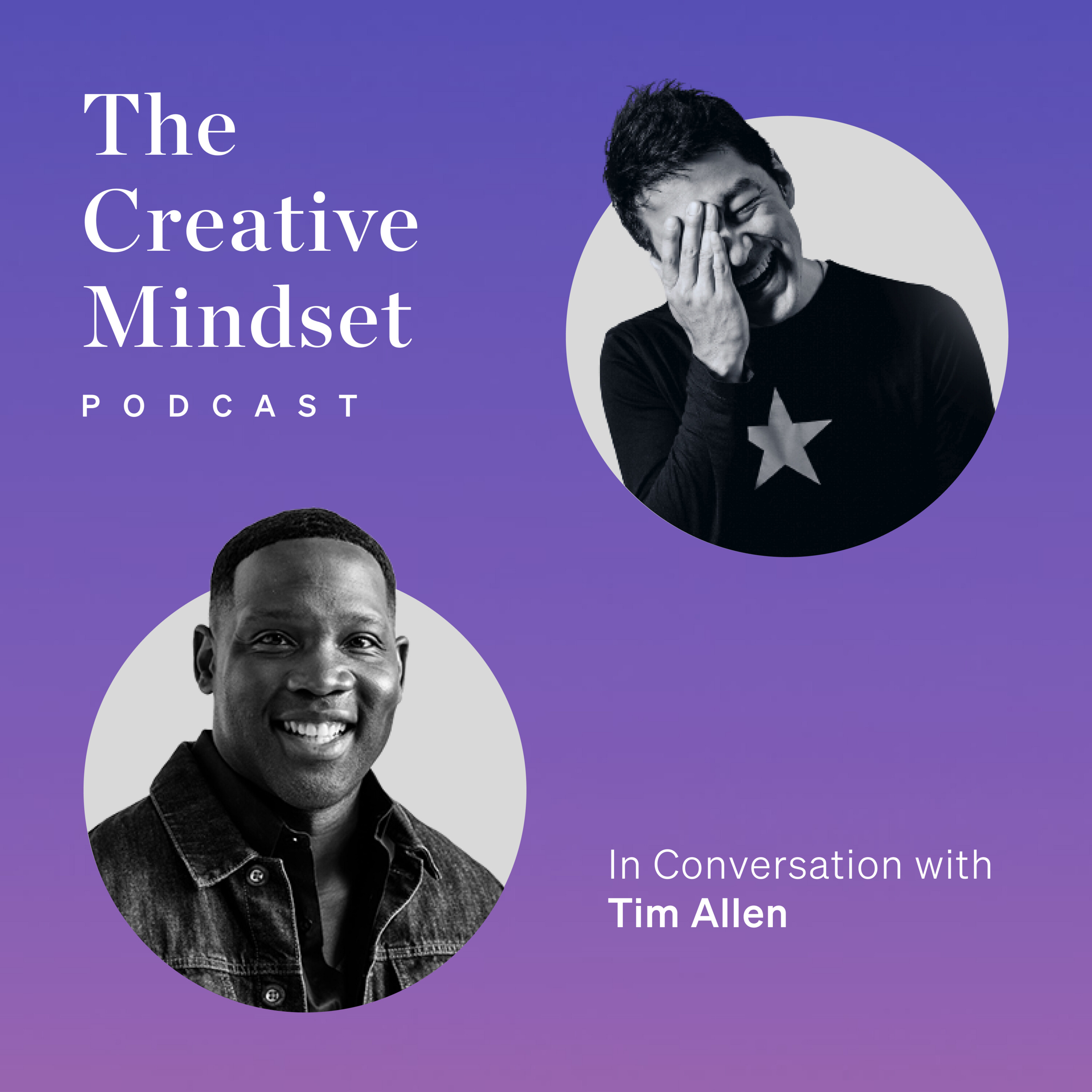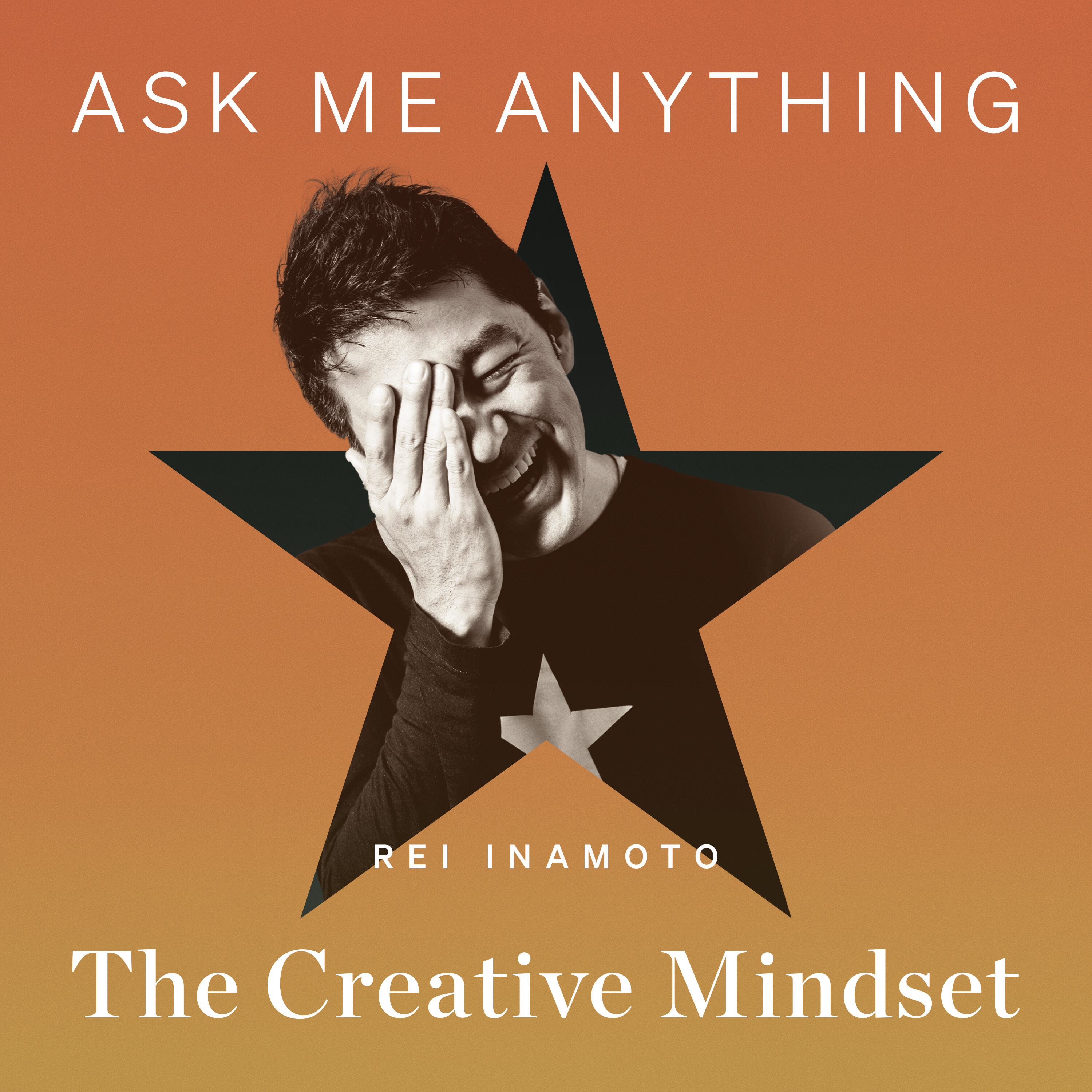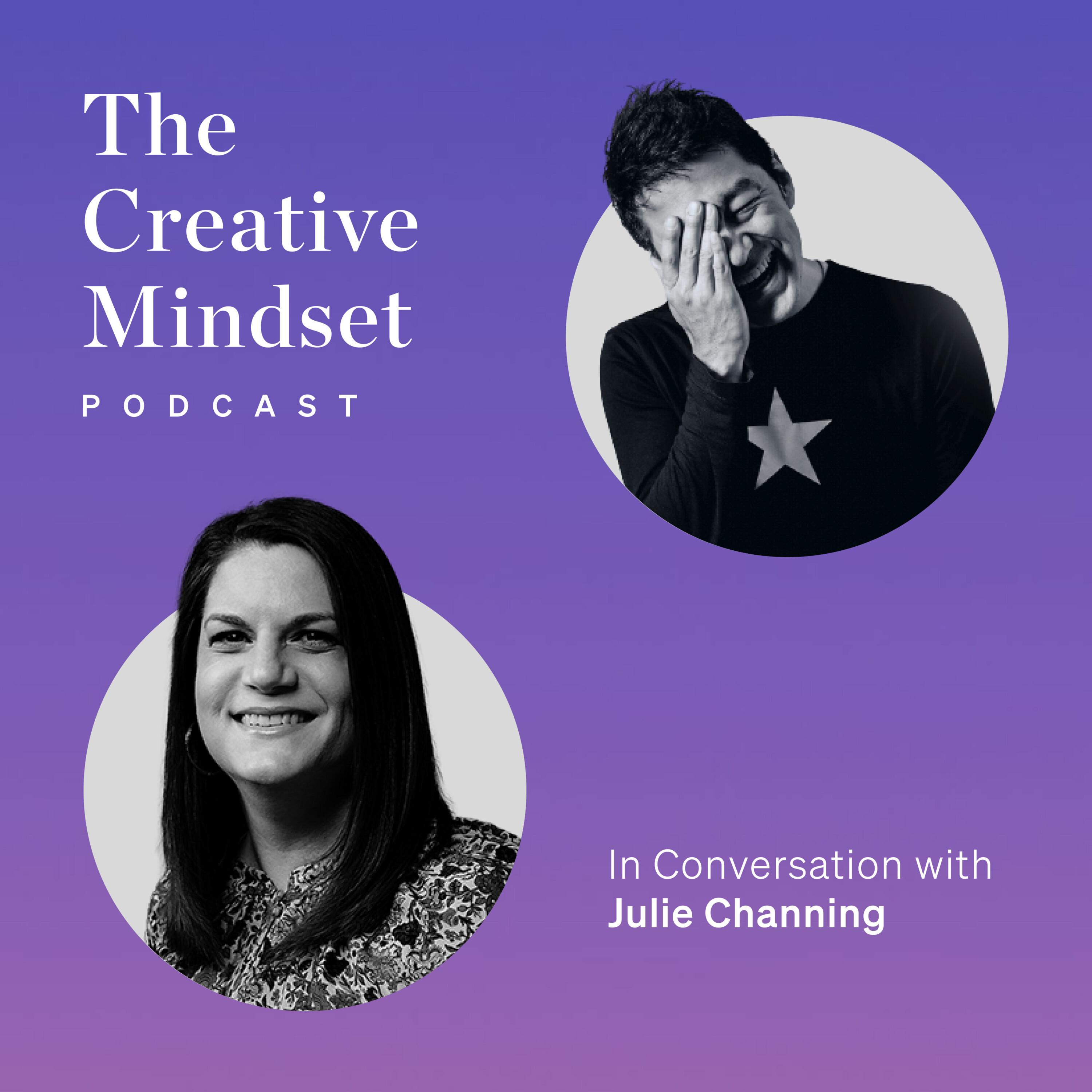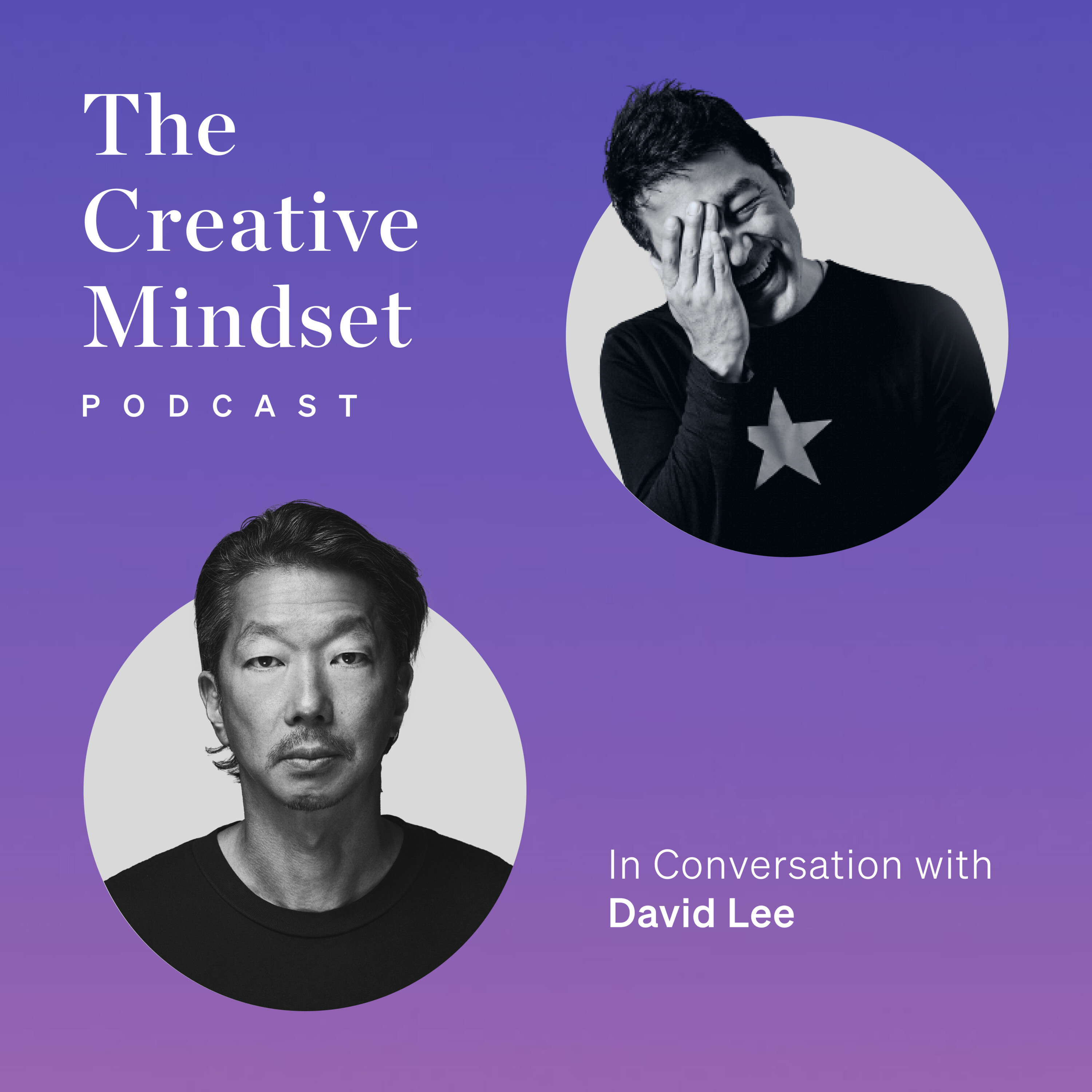This is Reinamoto's podcast, The Creative Mindset.
Welcome to The Creative Mindset, a podcast about the art of building a career through
conversations with the world's leading practitioners of creativity. It's an intimate journey on how
they got started, their turning points, failures, and tips on work and life. I am your host,
Reinamoto, the founding partner of I&CO, a global innovation firm based in New York and Tokyo.
Today's episode is part 1 of my conversation with Cindy Gallop,
the founder and CEO of Make Love Not Porn, the world's social sex platform.
Originally from England, she spent her childhood years in Asia. She went to college at Oxford at
the tender age of 16. After she graduated, she got into theater, spending a few years
not acting or directing, but actually doing PR for the theater company that she was working for.
There, she was encouraged by one of her audience members to go into advertising,
and that's how she found her entry. Starting as an intern, eventually she became the founder and
the CEO of the U.S. branch of BBH, one of the most respected and most creative advertising
agencies in the world. In this episode, she shares her learning from her career,
especially working in the 80s and 90s in Europe, in Asia, then in the U.S., becoming a leader,
how she managed her own happiness, as well as the members that she was managing at the time.
I met Cindy actually on stage back in 2010 in Tokyo, where I was a panelist,
and she wasn't quite a fellow panelist, but a moderator of that panel.
Ever since I met Cindy at that stage, she has become my role model, and I was always so inspired
by what she does and what she says. It was such an honor to talk to her, and at the end of this
episode, I will share three key takeaways from my conversation with Cindy. So let's get started.
So let's talk a little bit about your background, and I wanted to ask you about your career and
what you do now. Sure. So for the benefit of our listeners, I am half English and half Chinese.
My father was English. He's no longer with us. My mother is Malaysian Chinese. And I was born
in the U.K., but when I was six, we moved to Brunei, where my father had got a job,
and so that's where my sisters and I grew up. As some of our listeners may know, Brunei is
a very small country, 100 miles long, very small population. When we were living there,
200,000 people, and it's a very orthodox Muslim state. And my parents regularly,
subsequently, apologized to me and my sisters for our childhood, because Brunei was very devoid of
cultural pursuits and creative manifestations. And so I think that that is why I was actually
absolutely encouraged as a child, particularly by my father, to be creative. So I was a voracious
reader, which my father really encouraged, gave me very adult things to read. I used to draw a lot
as a kid, so that was really encouraged. I did a lot of drawing. I used to write myself. I wrote
stories. I wrote poems. All of these were very much encouraged. So from there, you say you moved
there when you were six, and then while you're there through, I guess, high school, and then you
back to the U.K. to go to college? Yeah. So I basically went to school in Brunei up to the age
of 14. I was a bit of an infant prodigy, so I was a couple of years ahead of my grade, as it were.
And so my parents sent me back to boarding school in the U.K. to do A-levels, which are the final
exams before you go to university. And then I went to Oxford, and so I went back to the U.K. to
go to school and university. So I did get into Oxford. I won a scholarship to Somerville. Then
I have to say, Ray, so the moment I turned up at Oxford, I was so grateful my parents had pushed
me, because it was a privilege to spend three years at that university. Amazingly historic
institution. You were studying within all of these beautiful old buildings in this gorgeous city,
in this wonderful educational system of one-on-one tutorials. And Somerville College
was incredible. Somerville was one of the first colleges that allowed women to study at Oxford.
It was founded in 1879. And by the way, women could study there, but women were not
allowed to graduate from Oxford until something like 1918. I mean, utterly ridiculous. And
that pioneering spirit has made Somerville what it is today. And so I felt that Somerville saw
my potential, wanted to bring it out. It was a wonderful place to study in. And also,
Oxford was where, again, creativity had full reign, because I fell in love with theatre at Oxford.
Obviously, it's a university with a ton of brilliant student pursuits. It has a thriving
student drama scene. And I really had not been exposed to theatre in that way previously.
And I just fell in love with all of that. And I wrote, acted, directed, staged, managed.
I was president of the Somerville Drama Society. And I decided all I wanted to do was work in
theatre for the rest of my life. But I knew I wasn't good enough to be an actress or director.
But as I mentioned, I used to draw a lot. And so my friends on the theatre scene sucked me
into designing theatre posters for their shows, which I really enjoyed. I designed a ton of theatre
posters. And then from that, it was one small step to them asking me to sell their shows for them.
So I basically was publicizing and marketing the student productions at Oxford. And I really
enjoyed that. And I thought, I bet it's easier to find a job doing this in the professional
theatre world than acting or directing. And it totally was. And so that's how I became,
post-university, a theatre marketer and publicist. So you were a designer before you went into
an industry. That's a piece of history that I never knew about.
Sadly, they're all in storage because there's no room to hang them here. But
I have a ton of my old theatre posters from Oxford framed. And if I say so myself,
I think they were rather good design-wise. Wow. So by this point, you're 29 yet?
I was. So I got into Oxford when I was 16. I took a year off. I went out when I was 17.
And so when I left, I was 20. And then actually, I did a year's MA at the University of Warwick in
Theatre of the European Renaissance. And after that, I began working in theatre. So I was 21
when I began working in theatre. Yeah. And then so after you graduate,
you go into theatre or marketing and PR and being a publicist in the theatre world. And
how long did you stay in that world? And what was the transition from there to the advertising world?
Sure. So I spent in total, I think, about three or four years. I worked at a couple of theatres
in the UK. Then I got completely fed up with working 24-7 and earning nothing because that's
theatre. Because you love it, you work all the time and you are earning chicken feed. And so I
was beginning to get disillusioned. And around this time, part of my job promoting the theatre
was giving talks about it. So I gave a talk to a group of women in Liverpool. And afterwards,
one of them came up to me and she said, young lady, you could sell a fridge to an Eskimo.
And I thought, that is the universe telling me something. Time to sell out going to advertising.
And so I did. Wow. So this was when you were about 25-ish?
Yeah. This is in 1985. Wow. And then your first job in advertising,
how did you, what was your foot in? Right. Now, it was extremely difficult to
break into advertising. Because in 1985, advertising was one of the hottest industries
in the UK. And generally, by the way, here in the US as well. Things are a bit different now.
So what I did was, so first of all, I applied for jobs, saying I've got all this experience,
very translatable marketing and theatre marketing. And fell into that double bind where
it was people wouldn't give me a job because I didn't have any advertising experience. But I
couldn't get advertising experience unless I got a job. So then I basically went back to ground zero
and I applied for the post-university graduate training schemes. So I'm not sure how much
agencies in the UK do this these days. But back in the day, you went on this thing called the
milk round, which was where Oxford and Cambridge and every other university basically sent students
to, advertising agents said, we will take this many entry level graduate trainees and we have
a whole training program, very, very lengthy intensive in those days. And then you get to
work in our agency. So I basically was applying for those entry level schemes, three or four
years late, because everybody else was fresh out of university. So I took the first job I was
offered on a graduate training scheme, which was the agency Ted Bates, back in the day when it
existed, it no longer does. And I have to say, I absolutely loved it. First of all, the good thing
about those days is you literally as a graduate trainee, you spent six months working in every
single department in the agency. I went into account management, but they moved you around,
production, traffic, the creative department. And so you really got a very holistic education
on absolutely everything that goes into doing what we do. And then at the other end of that,
I came out as a baby account exec, and then began climbing the ladder in account management.
Yeah. What's the most important thing that you learned in that six-month training program?
Precisely because my background is account management, that was what I was being trained in.
I absolutely saw how integral account management's role is to making sure that creativity
flourishes and creativity gets bought. Because again, we are talking London in the 80s,
this is old school advertising training. This is you sell the work, you don't come back to the agency.
And so I absolutely saw the power of building relationships with clients
that meant that you created a climate of receptivity to be able to sell the best creative
work. And I also saw how much account management needed to basically make everything work together
to get the desired outcome in the desired timeline, presented to the client in the desired way.
And so really, that gave me a huge respect for the role of account management,
and I have defended it ever since to the wrong-headed people who think it's dispensable
within our business because it really is not. So for the listeners who might not be familiar
with the advertising industry, could you explain a little bit about what is account management?
So account management, it's called account management, it's called account handling.
But essentially, you are the interface between the client and the rest of the agency. And so,
it is your job to build a really strong working relationship with the client. You are their
partner. You are shoulder-to-shoulder with them in helping them achieve the business results
they're looking for from the work the agency does for them. But you are absolutely about
getting the client to trust you, getting the client to have faith in what the agency is doing
for them, really working with them to uncover consumer insights and then feed into the
strongest possible strategies and creative briefs, and really building a relationship
where their level of trust is such that they absolutely believe in what the agency recommends
and make the leap of faith that we always require clients to do when we are presenting a creative
idea that they have to buy into and believe that we can execute it in the way that we say we will.
And so, you said it was 1989 that you went to BBH and you spent a long time at BBH, all the way to
being the chairperson when you opened BBH in the US. So you touched upon this a little bit as an
account person, being in the account management team, your role was to foster creativity and make
sure that the creativity flourishes. So tell us a little bit about what you learned along the way
and what you did in order to make sure that the team was as creative as it can be.
Sure. And actually, Ray, I wonder for the benefit of our listeners, I want to tell
our audience how I ended up in New York because this is something I know we're going to come on
to talk about how Japanese people can pursue creativity in the way that they want to. And
I just think it's useful to hear some of my stories in this way. So, there I was at BBH
in London in the early 90s, young, thrusting, ambitious account director. And so, I did what
you do when you are young, thrusting, ambitious account director. I pinned Nigel Bogle up against
the wall and I said to him, where am I going in this agency? And so, Nigel did a classic
management technique, very good one of he turned the question back on me. And he said, well, Cindy,
you tell us what you want to be in this agency and we'll make it happen. And he said, and don't
be bounded by the realms of the possible. If you want a job that doesn't yet exist in this agency,
tell us. So, I thought, okay, great offer. I went where I thought about it. So, I came back
and bear in mind that this is when BBH only had one office in London. So, I said to Nigel Bogle,
my dream job is running BBH North America. And to be my total dream job, I said, I'd be okay doing
it in San Francisco. And the reason I said that was because we had the Levi's business, as you know,
and Levi's is headquartered in San Francisco. But I said, but to be my total dream job,
I would do it in New York. So, Nigel said, okay, that's interesting, because actually,
we've just begun talking about the U.S. So, your request is locked. Now, what then happened was,
there was a lot more pressure for BBH to open up in Asia Pacific first, because we had clients there
who obviously were a very long way away and wanted a presence in the region. So, I went out to
Singapore in 1996 as the number two to Simon Sherwood to help start and run BBH Asia Pacific.
In Singapore?
In Singapore, yeah. And Nigel said, this will be great experience for you when you then go on to
open up the U.S. office. And so, I did that for two years. Then in 1998, I got my dream job,
which was starting up BBH New York. And so, I moved here in September 98. And BBH U.S. literally
began as me in a room with a phone, starting an advertising agency in the world's toughest
advertising marketplace, Madison Avenue, as you know. My employee number two was my executive
creative director, Tai Montague. And so, to answer your question, Ray, about how I fostered a culture
and cloud of creativity. So, first of all, that first fall, I think, December 1998, our Christmas
holiday party was six people around a table in a restaurant. But from day one, I said to my team,
our vision is that we are going to be the best agency in America. And I said to them, now,
if the guys at J. Walter Thompson, Weiner, McCann, Erickson could hear us say that,
they'd be rolling around on the ground hysterics laughing.
Okay. But here's the thing. When we decide that we are going to be the best agency in America,
that means that we then measure everything we do by, does this take us one step closer to being
the best agency in America? And that's how you ensure a culture of excellence, because you are
measuring yourself against that standard, even when you are half a dozen people in one room in
the Tribeca Film Center, trying to win business. So, I would say, first of all, absolutely set
your creative vision of what you want to be and then measure yourself by that standard,
even if it seems very, very far away. Then the second thing I would say is, honestly, the single
best thing you can do to foster creativity is to create a happy working environment.
Create a culture where everybody feels enormously happy working there, because then creativity
will absolutely flourish. Creativity cannot flourish when you are enormously stressed,
when you are working in a climate of fear, when you are under tremendous pressure.
Some years ago, an agency hired me to consult with them and they said to me,
Cindy, how can we be more creative? And I'm a big fan of radical simplicity. I like to keep
things very simple. I said, it's very simple, have less meetings. Nobody can be creative when
your calendar is full of back-to-back meetings every single day. Literally, at ground zero,
if you want to do one thing to start being more creative instantly, have less meetings.
Give people time to breathe, to think, to let their minds roam. But people do that best
in a really, really happy working environment. And I pride myself that that is what we created
at BBH New York in the early years. And honestly, I say that because feel free to ask anybody who
worked there. And I think that they tell you that. When I interviewed potential new recruits
at BBH in those early years, I would say to them, if the interviews went well and I really wanted
them to come work with us, I'd give them the phone list and I'd say, feel free to ring any person on
this list and ask them what it's like working here. Because I was very confident that what
they would hear would be good. I want to press on that a little bit because I came to New York
around the same time, I think in 97, 98. And when I got into the industry, I started as a designer,
and the work-life balance wasn't quite what it is now. Just socially and professionally,
and especially in New York, and especially if you're in your 20s, you were somewhat expected to
work hard or work long hours, I should say. And I did pull a lot of all-nighters. So that's number
one. Number two, the advertising and creative industry is a very competitive one. You're
pitching against other rival agencies, so you stay long hours. And when you work, not just hard,
but when you work long hours, it's difficult to maintain happiness. So how did you do that,
especially in the late 90s, early 2000s, when in New York, which is one of the toughest markets,
and especially in advertising, how do you balance that happiness versus hard work?
Sure. So several things. First of all, and this is kind of inevitably a result of being a startup
agency, we had a very young staff. We had a very young staff because we couldn't afford to pay
whacking-rate salaries. And by the way, I did also, obviously, I was interviewing senior people.
I remember talking to a number of senior people in the industry back in the day.
Not everyone was prepared to take a chance with a startup agency. BBH coming to the American market,
nobody knew how it was going to go. And so I also remember senior people turning me down.
But what that meant was that we had a lot of young staffers who didn't have babies
and children. So, A, they didn't have the pull of family time in the same way.
But B also, we were all – those early years were wonderful. We all had a very clear vision of what
we wanted to achieve. We were working – and I think this is very important to say as well,
because this is absolutely the BBH culture that was important. We were working in a culture of
utter integrity and principles, as in, we only wanted clients who wanted what we did.
In credentials meetings in those days, the first thing I would do was play our reel,
because obviously, this was back in the day when – and if I saw a sharp intake of breath at any of
the ads on it, I knew this is not our kind of client. And I did that deliberately. I did that
as a kind of filter. I'm going to put Shah's work right up front. And if you go,
then we may not be the best agency for you. What that meant was that everyone really
believed in the vision. Everybody loved the agency brand and the culture. And so,
everybody really enjoyed working those long hours. And I made sure that we had agency
nights out together. We had a day out every year where we did things like went out on a boat on the
river, et cetera. And we had an agency softball team. We joined the agency softball league,
all of that. And so, actually, people were very happy. There was no concern within our ranks about
work-life balance in that context. By the way, possibly helped by the fact that
this is also an inevitable product of a very young agency. Okay. There were a number of affairs
and relationships. But I hasten to add, I mean, first of all, bear in mind, you had a female CEO.
So, all of this was entirely consensual, obviously. And secondly, I'm happy to report that a number of
them ended up as marriages. There are a number of agency marriages that came out of those early
years that are rock solid marriages today. So, we all were working really hard, but I did my best
to make sure that it was in an environment that made it tremendous fun. We weren't pushing anybody
beyond limits. And also, Ray, because I think I am quite unique on a number of fronts in terms of
my approach to leadership. So, for example, when we were pitching, I absolutely believe
the most fundamental requirement for a good corporate culture, good agency culture is trust.
When you believe in people, they will rise to that belief. So, we would pitch and I would put
somebody in charge and one of my senior account directors will be running it and whatever.
So, and I'd be involved along the way in various meetings. But basically,
I would be shown the full pitch presentation, say a couple of days before we were due to go and make
it. So, the team would take me through the pitch presentation. And my job in that scenario was
absolutely to make sure the pitch was the best it could possibly be. So, I would have some views
on things that I wanted to change about whatever was in the presentation.
But before I expressed those, you know, my question to myself was,
if I ask for all these changes to be made, how much human pain and suffering is that going to
cause? And as far as I was concerned, if any change I requested meant the studio was going
to be up all night doing it, my team was going to be running around without sleep when I needed
them fresh for the pitch. My first question to myself was, how much human pain and suffering
are these changes going to cause? Because if it's insupportable, I'm going to live with,
you know, what we have. I mean, obviously, I'm going to make sure it's the best it can be,
but there is a limit to how much you slash and burn when you are going to devastate your team.
So, that's part of what I mean when I say, although we were all working really hard,
I was really trying to make sure that it was in an environment where everybody felt highly motivated
and very happy because we were all working towards a common goal,
which was to make BBH America the best agency in America.
What was the first turning point for BBH in the U.S. as a female CEO?
Yeah. A really big turning point was in 2002 when Levi's moved their entire U.S. business
into us without a pitch. And by the way, what was funny was, I know that when that happened,
everybody thought that I've been working behind the scenes and I really hadn't. I mean,
but obviously, Levi's had a great relation with BBH because of the European work.
I had met Robert Hansen, the president of Levi's. We had a good sort of getting to know each other
relationship. But really, it was because in 2002, their business was not doing well.
And Robert decided it was time to make a major move. And he moved the business out of FCB
and into BBH. And he said to me, and Cindy, failure is not an option. No pressure.
But obviously, that – I mean, that doubled the size of the agency because I had to hire to
service a business that large. So, that was terrific. And then that same year,
we were awarded Adweek's Eastern Agency of the Year. And that was only four years after we'd
started. And I think that was the quickest that any agency had started and then gotten
an award of that significance. And so, that was a really great moment.
I'm going to turn back to the role of account management a little bit. And having worked in
the agency business for quite a while as well myself, I've seen a relationship between an
account director and a creative director that didn't quite work out. Because the creative
director would be a little bit territorial in terms of usually his creative territory
and the creative direction and creative decisions that they wanted to make.
And from my experience, the best account people that I've worked with
have also been good creatives themselves. Yeah. So, you know, creatives have egos.
How did you manage those egos?
Well, so here's an interesting thing, Ray, because to your point,
you know, within the culture of BBH, it's very different.
It's very different. You know, I grew up in account management in the UK and within BBH,
where account management is expected to sell the work, you know. And I am very,
very good at selling and I'm very good at selling creative work. To your point,
culturally in the U.S., I think that has been the case in other agencies.
Within BBH, our culture was absolutely about, you know, the creatives always knew that we were on
the same side, we're on the same page and that account management was out to sell their work
the hardest they possibly could. Wow. Wow. All right. So moving forward,
why did you leave BBH? So I, back in 2005, I turned 45
and I had my very own personal midlife crisis in the sense that I'd always thought of 45
as kind of a midlife point. Obviously, by the way, in the happiest assumption,
one lives to be 90, fingers crossed. But in a couple of years running up to it,
I'd always gone, on one's 45th birthday is the moment when you should pause,
take stock, reflect and review, where have I been, where am I going?
So February 1, 2005, I duly did that. And that was the point at which I went,
oh my God, I've just worked 16 years for the same advertising agency.
And wonderful agency, love BBH to death, I cannot say enough nice things about them.
But I went, maybe it's time to do something else. And I'd worked for them in London,
worked for them in Asia, opened up the agency in the U.S. And the problem then became,
I hadn't the faintest idea what, because I'd said to people for years, not going to work in
advertising forever, not going to work at BBH forever, but advertising is a really great industry
to work in, to identify what you want to do next. Because as you know, Ray, we come into contact
with so many different industries, so many different companies, people. And I guess I'd
always thought that one day my next big thing would bubble up from the ether. Then I was at
the age of 45 and it hadn't. So vast amounts of thought and angsting ensued. And eventually I
went, if I want to review every possible option open to me, what is effectively the second half
of my life, maybe the best thing to do is to put myself on the market very publicly and go,
okay guys, here I am, what do you got? And see what comes. So I took a massive leap into the unknown.
I resigned as chairman of BBH New York in the summer of 2005 without a job to go to.
And honestly, it was the best thing I ever did in my life. Because, and I suspect you empathize,
I am now evangelical about working for yourself. You know, too many people make the mistake of
thinking that a job is the safe option. It's not. Because in a job, you are at the complete mercy
of management changes, industry downturns, marketplace dynamics. I always say to people,
whose hands would you rather place your future in? Those of a large corporate entity who at
the end of the day doesn't give a shit about you, or somebody who will always have your
best interests at heart, i.e. you. Yeah. You know, you have enough experience to have
confidence now. But, you know, when you were 22, when you were 25, 28, I'm sure,
you know, what did you do to overcome, like, how did you manage fear? Honestly, back in the day,
I just worked really hard. You know, I mean, that was what I did. That was what you did, you know.
But what I would say is that this is also, again, where the culture of BBH came into play. Because
when people would ask me, Cindy, you know, you've spent 16 years at this agency. You know,
what is it that keeps you here? You know, is it the brilliant creative work, great strategic
thinking, fantastic people? And, you know, all of those contributed. But fundamentally,
I spent 16 years at BBH because BBH has more integrity and principles than any other place
I've ever worked at. And that matters more to me than anything about where I work.
I knew that if a client called the agency leadership complaining about me, they'd be
on my side first. And so, you know, fear is very different when you don't have to feel fear about
that. So it's the integrity of the organization that had your back. Yeah. And, you know, in a way,
this is an overall truth, Ray, because I would say, in my case, when you very kindly call me
fearless, it's not about the absence of fear. It's about the presence of values.
You know, I believe that everything in life and business starts with you and your values.
And this is why I encourage everybody, if they've never done this exercise,
to take a long, hard look inside themselves and to ask themselves, what do I believe in?
What do I value? What do I stand for? What am I all about? Because when you know that,
that makes life so much simpler. Life still throws you all the shit it always will,
but you know exactly how to respond to it in any given situation in a way that is true to you.
And by the way, that is the secret of happiness. And so I am always and have always been living
and working my values. And when you know that you are doing the right thing, you don't feel fear.
The first key takeaway that I had from her experience and what she talked about
is verbalize what you want. In the case of Cindy, she must have felt some kind of frustration to
feel, oh, where am I going? So she just took the step of talking to her boss what she wanted.
And she actually didn't know first, credit to her boss who asked her, well, Cindy, you know,
what do you want to do and where do you want to go? She went away and she thought about
wanting to become the founder and the CEO of BBH in New York or in the US. They actually didn't
have a presence at the time. BBH was already a very successful agency in the UK. Her boss then,
before giving her that opportunity, sent her to Singapore to start BBH in Singapore with another
person so that she can learn from that experience. And then a few years later, she asked to go to
New York to start the US presence of BBH. So the crucial step that she took and my first key
takeaway from my conversation with Cindy is verbalize what you want. By saying what you
want, by putting into words what you think you want actually helps you realize what it is that
you want and make that happen. But the difference that I noticed, you know, I'm in the position to
manage people. I'm in the position to manage a company. And in the last 10, 15 years, I've had
many people come and go from the companies that I've been part of. But I would say four out of
five people who have left the team and the company that I was managing or that I was a senior member
of, we never had the chance to talk about why they wanted to leave. By the time that we had that
conversation, it was too late. You know, they had become unhappy in the work environment
that we were working in. And they had come to the conclusion of leaving that workplace to find
a quote-unquote better thing. My second key takeaway from Cindy is the exact phrase that she
said, which is make sure creativity flourishes and make sure creativity gets bought. This made me
realize that in a creative environment, it's not just about making creative things, but it's about
making sure that creativity flourishes in that environment. And it's not good enough to just
come up with creative ideas, but you have to make sure that creativity gets bought. So an account
person is the person who is the interface between the client and the agency. And she's not necessarily,
she wasn't necessarily the one to be making things. But what struck me from what Cindy was saying,
she has such pride in what she did as an account manager at the agency that she was working for at
the time. And that's such a crucial role in the world of creativity. So key takeaway number two,
make sure creativity flourishes and make sure creativity gets bought. And then number three,
my key takeaway number three is happiness is what you manage. Happiness is what you manage.
In this episode, she talked about when she was leading that company and she will be leading a
pitch to get a new piece of business. And the impression she made on me about the way she
managed her team was that she led with empathy. And what I mean by that was that empathy is about
understanding what other people are feeling. And in the context of a professional creative industry,
which is highly charged with emotions, just because people who are making things,
people who are creative tend to be quite passionate about what they do. And they put a
lot of passion into what they do. So they get emotional. But as a person who was managing that
environment, she always applied empathy to the way she managed that team so that she was always
conscious of how they felt and how they may feel based on what she would make them do.
She mentioned that whenever she would review the work before she said something, she would think
about, OK, if I say this or if I give this feedback and the presentation is in 24 hours or 48 hours,
what would they have to go through in order to get to that point, what I'm trying to get to?
And if it would require her team to pull an all-nighter to get to that point, she wouldn't
say it. And not only did she manage her own happiness, but she was always consciously
managing the happiness of what she was managing. So happiness is what you manage.
So just to summarize the three key takeaways, number one, verbalize what you want. Number two,
make sure creativity flourishes and make sure creativity gets bought. And number three,
happiness is what you manage. So those were the three key takeaways from my conversation with
Cindy Gallop, the founder and the CEO of Make Love Not Porn. If you apply these three principles
to what you do, I think they will definitely help your career and they will definitely help you
get what you want in your career. Next time, we will continue this conversation where she talks
about the second chapter of her career, Make Love Not Porn. This one is less about how she built
a career, but more about how she built a company or how she is building a company
and the insights that she shares from being an entrepreneur. So stay tuned.
I am your host, Reina Moto, and this is The Creative Mindset. So see you next time.
